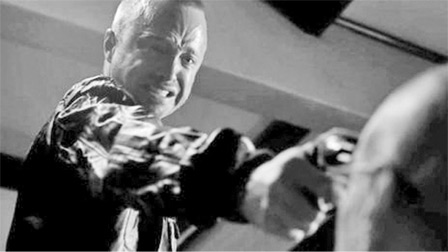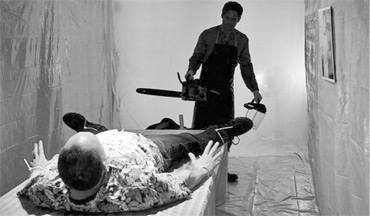Is TV becoming too violent?
From Hannibal to True Detective, brutality draws rave reviews. Ken
Tucker asks, when did ‘dark’ and ‘grim’ become synonymous with serious
artistic intent?
For some time now, the most reliable way for any maker of TV to prove
he or she is serious, ground-breaking and taboo-busting is to produce
grim, dark and - that most overused term - ‘edgy’ drama. The Good Wife
and Parenthood are arguably as adventurous in both form and content as
bleak-athons such as Breaking Bad and Homeland, but put these four
excellent shows on an Emmy voter's ballot and you know that it is the
last two that are going to come out on top.
The cliche that TV is the ‘new novel’ remains vital in one respect:
the more literary, symbol-laden and existentially despairing a work is,
the more likely it is to receive sober analysis and the respect of its
creators’ peers.
 Thus, it has been ever since the late-20th-Century emergence of great
trinity of grim: Oz, The Sopranos and The Wire. Thus, it has been ever since the late-20th-Century emergence of great
trinity of grim: Oz, The Sopranos and The Wire.
In recent years, exploring the dark side has become something of a
fetish franchise for both broadcast and cable networks, and its
preferred sub-genre is the serial killer saga. There is no better
example of how grimness operates as a business and artistic strategy
than Hannibal. Derived from the Thomas Harris creation that peaked with
his novel, and movie adaptation, The Silence of the Lambs, Hannibal
stars Mads Mikkelsen as the supernally suave serial killer Hannibal
Lecter and Hugh Dancy as his sweatier, victim-haunted FBI foe, Will
Graham. Harris’ creations have been adapted for television by Bryan
Fuller, whose previous project was the well-reviewed but low-rated
Pushing Daisies.
From a business standpoint, Hannibal was a logical next step for
Fuller, who needed both a reputation upgrade and a commercial hit after
Daisies wilted. One of television's most gifted stylists, Fuller lowered
the lights and slowed the pace for Hannibal. When the killer and the FBI
agent converse, it is in hushed tones, the two of them seated in rooms
lit to burnish the gloom attending the grey or deep-burgundy hues on
house, office or prison walls. Fuller's template for the series compels
episode directors to make their cameras glide across the frame like
ghosts hovering over scenes of mutilated victims, usually women, impaled
on spikes or – a recurring image - a great stag's horns.
Hannibal was met with the sort of rapturous reviews rare for a
network drama these days. As a result, it is considered the thinking
person's Criminal Minds.
Grim reaps rewards
When a dark TV series succeeds, it can yield a bounty of awards -and
profits. Yet the success rate of grimness remains a gamble. Dexter, the
serial-killer series set in sun-dappled Miami, was a hit for eight
seasons, and took its leave voluntarily.
The Killing, all dreary, damp Pacific Northwest weather and droopy
loose ends, was a pop-culture sensation its first season, much like its
original version from Denmark.
But by its second, it devolved into one of those shows people watch
simply because they've made the initial commitment and want to see how
it played out.
 Cancelled (twice!) by AMC, its upcoming resurrection by Netflix is a
puzzle more baffling than anything The Killing has yet put on screen. Cancelled (twice!) by AMC, its upcoming resurrection by Netflix is a
puzzle more baffling than anything The Killing has yet put on screen.
Hannibal itself, for all the raves, has never attracted too many
customers. Even less successful is A and E's Those Who Kill, which
thought it was an original idea to have Chloe Sevigny portray a
tough-as-nails homicide cop whose closest ally is a professor who
specialises in the study of serial killers. It was pulled after a mere
two episodes after premiering to dismal reviews and ratings.
The same network has succeeded with a better show: Bates Motel,
ostensibly a post-Hitchcock riff on the youth of future serial killer
Norman Bates (the pert Freddie Highmore), but actually a fine portrayal
of clingy motherhood as embodied in the wonderfully lively, witty
performance of Vera Farmiga as Norman's mother, Norma.
Equal opportunity horror
Farmiga's work serves to suggest that the more women in front of and
behind the cameras, as protagonists rather than wallpaper, the more
interesting and complex a thriller genre can become. The lack of the
same can put a show in a grim pickle.
Such was the case with True Detective. Its premiere, which featured
the torture-murder of a young girl linked to a string of such crimes,
was greeted rapturously, as the TV equivalent of deep-fried Southern
Gothic, a gumbo mixing Flannery O'Connor's eerie grotesques with James
Lee Burke's police procedurals. Within a few weeks, however, a new
critical narrative wrapped itself around its dramatic narrative like
suffocating cling film: the series was castigated by critics for not
giving any of its female characters the kind of garrulous gravitas or
gonzo wackiness that stars Matthew McConaughey and Woody Harrelson were
granted.
The robustly rated show The Following, which stars Kevin Bacon as a
melancholy FBI man cursed with a talent to get inside the minds of the
deranged, appears - on the surface - to address that problem. Its
primary villain, Joe Carroll (James Purefoy), is a throat-slasher
professor whose morbid imagination is inspired by the poetry and short
stories of Edgar Allen Poe. In The Following, there are actually serial
killer cults within serial killer cults: Carroll survived the show's
first season to see a copycat creep emerge. She's played by Connie
Nielsen, and her presence seems a sop invented to grant The Following
immunity from charges of gender underrepresentation among serial
killers.
It's one thing to go to a grisly horror movie and emerge shaken,
shrugging it off or contemplating the nature of evil with your popcorn
partner for a few minutes.
It's another thing to return, again and again, week after week, to a
regular diet of these TV series that deal in the unspeakable.
Why do we do it? To be grateful that we've never encountered evil at
that extreme? To take our moral pulse and comfort ourselves to know
that, while we each have our faults, we are not capable of committing
crimes like these? Perhaps.
But serial killing - as a naughty release valve of aggression and as
a bid for serious artistic intent - has begun to feel like overkill.
I'd like to say that we're due for a backlash, for a new wave of
quality optimism, of the best minds of the TV industry applying their
artful sensibilities to the themes of joy, intricately adroit romance,
and madcap generosity. But in drama, dying is easy, happiness is hard.
- BBC |

